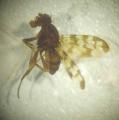Diptera.info :: Miscellaneous :: General queries
Who is here? 1 guest(s)
|
oil glands and walking on water
|
|
| Louis Boumans |
Posted on 05-10-2006 17:03
|
|
Member Location: NO Oslo Posts: 269 Joined: 09.06.04 |
Thinking about a Dolichopodid that walks on the water surface (see http://www.dipter...ad_id=3585 - would it be offensive to talk of 'Jesus flies'?) another general question came to my mind: Are any specific adaptatios known that enable Diptera to walk on the water? I know some insects have oil glands; is hydrophobic oil used to prevent the tarsi from sticking onto the water? Thanks in advance, Louis Edited by Louis Boumans on 05-10-2006 22:52 |
|
|
|
| Tony Irwin |
Posted on 05-10-2006 21:12
|
|
Member Location: Norwich, England Posts: 7336 Joined: 19.11.04 |
As far as I know, most insect cuticle is fairly waterproof, but can be made more so by the addition of hydrophobic hairs or scales. I'm not sure whether the hairs are regularly "dressed" with oil or wax or whether they are structurally hydrophobic anyway. I once looked at the feet of some ephydrids using a scanning electron microscope. What was clear was that the specialist water walkers like Ephydra have greatly reduced puvilli and empodium (not absent as some books say!), and that the hairs around the last tarsal segment are rather long. I suspect it's the hydrophobic nature of these tarsal hairs that stops the fly breaking through the water surface. The difference between a "terrestrial" ephydrid like Lamproscatella (on the left) and an "aquatic" ephydrid like Ephydra can be seen in this photo. Tony Irwin attached the following image:  [63.25Kb] Tony ---------- Tony Irwin |
|
|
|
| Louis Boumans |
Posted on 05-10-2006 22:51
|
|
Member Location: NO Oslo Posts: 269 Joined: 09.06.04 |
That is very interestig, Tony, nice pictures too. Is tha a general pattern in Ephydridae, that 'aquatic' species have reduced pulvilli? I had another look at Poecilobothrus: this doly has normal pulvilli and no particularly long hairs on its tarsi. Though I never really studied it, I've seen all kinds of insects drown...  so there must be some special adaptations for the water walkers. so there must be some special adaptations for the water walkers.Louis Edited by Louis Boumans on 05-10-2006 22:51 |
|
|
|
| Igor Grichanov |
Posted on 07-10-2006 08:06
|
|
Member Location: St.Petersburg, Russia Posts: 1798 Joined: 17.08.06 |
Dear Tony, I do not think that dolis could support this idea. Most dolis have more or less well developed pulvilli and long apical hairs on 5th segment. And many can stay on water, though a few genera are considered to be water-skaters. Meanwhile, some dendrophile (Medetera) and lithophile (Scellus, Liancalus) genera have greatly developed claws. I suspect why. Igor. |
| Jump to Forum: |













